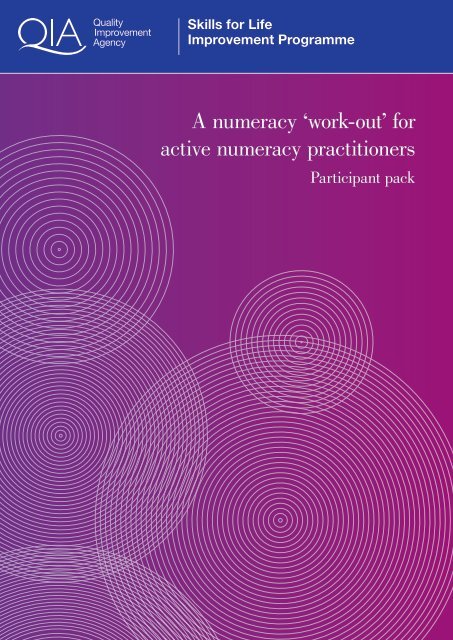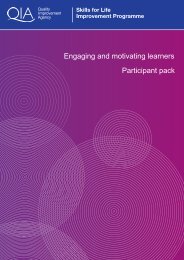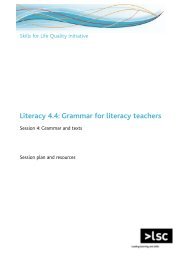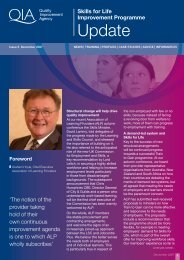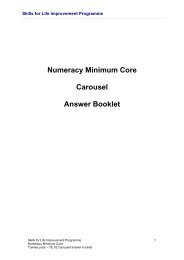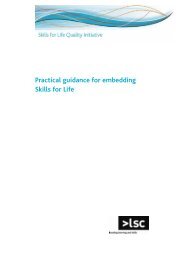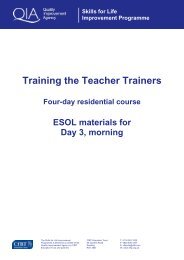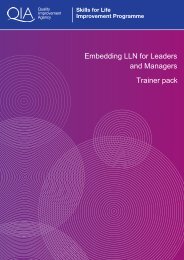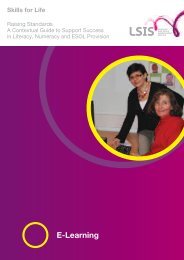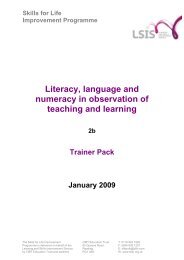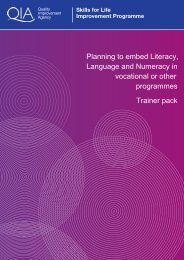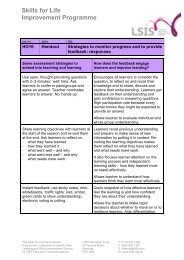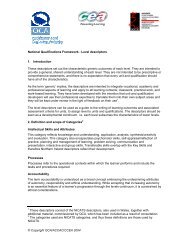A numeracy 'work-out' for active numeracy practitioners
A numeracy 'work-out' for active numeracy practitioners
A numeracy 'work-out' for active numeracy practitioners
Create successful ePaper yourself
Turn your PDF publications into a flip-book with our unique Google optimized e-Paper software.
Skills <strong>for</strong> LifeImprovement ProgrammeA “<strong>numeracy</strong> work out”Reflective logThings that struck me as interesting today How I might use/adapt this idea with <strong>numeracy</strong> learnersHandout 3
Skills <strong>for</strong> LifeImprovement ProgrammeA “<strong>numeracy</strong> work out”Action PlannameAfter this event, I’m going to…. By when? People I’d like to discuss this withFurther training / professionaldevelopment I will look <strong>for</strong>By when? People I’d like to discuss this withHandout 3
Skills <strong>for</strong> LifeImprovement ProgrammeActivity 1: The good <strong>numeracy</strong> tutorWhat makes <strong>for</strong> a good <strong>numeracy</strong> tutor? Count up the most importantcharacteristics. Divide up the circle into the same number of segments/sectors. Label each part with one characteristic.The centre of the circle represents LEAST CONFIDENT. The circumferenceof the circle represents MOST CONFIDENT.Start in any sector. Place your pen on the paper at a point that representsyour level of confidence <strong>for</strong> that characteristic. WITHOUT TAKING YOURPEN FROM THE PAGE, continue round until you have a complete profile ofyourself as a tutor.Handout 4
Skills <strong>for</strong> LifeImprovement ProgrammeActivity 3:Ready, Steady, Cook … up some numbersTip out the bag onto the table.Decide, in pairs, which object you want to work with (remember, the bag itselfcan be an object)Devise as many different <strong>numeracy</strong> activities as you can, at different levels,<strong>for</strong> different types of learner and reflecting each of the 3 different spheres ofinfluenceRecord findings as a poster on flipchart paper the activities you devise andprepare to feedback any issuesTry to be as imaginative and open ended as you can in devising exploratoryactivitiesThink about the usefulness of the process of making a poster as alearning/thinking activityHandout 5
Skills <strong>for</strong> LifeImprovement ProgrammeActivity 4:Ordering probabilities and ordering decimal numbersMathematical goalsFor learners to:• Understand that probabilities are assigned values between 0 and 1• Use some language associated with probability• Order decimal numbers between 0 and 1Method• Fix string across the room or along one wall.• At one end attach a card that says “certain” and at the other end onethat says “impossible”• At intervals attach cards that say “fairly likely”, “very likely”, “not verylikely” etc.• Prepare some cards that are either topical or relate to particularinterests of learners, e.g.o We will get a new Prime Minister this yearo Manchester United will win the premiership titleo Tomorrow’s session will be cancelled• Encourage learner to attach cards at appropriate places on the stringand discuss their decisions• Ask learners to write events on some blank cards and attach them tothe string at the appropriate place• Talk about the values 0 and 1 at either end, and their significance• Attach cards with some decimal numbers, e.g. 0.5, 0.3, 0,75 atappropriate places along the string• Ask learners to assign decimal numbers to event cards on the stringand attach them in the right place• Allow learners to have an open discussion about whether events andnumbers are in the right order and make changes as needed.Reflection and consolidationGive learners a long piece of card and ask them to draw a probability event oftheir own, with events and associated probabilities of their choice.Adapted from DfES Standards Unit:Improving learning in mathematicsHandout 6
Skills <strong>for</strong> LifeImprovement ProgrammeActivity 6:Using Directed Activities related to Text (DARTS) to encouragethe development of literacy and language in mathsLanguage can be a barrier to solving problems. Learners who can work out theanswer to a simple calculation may not be able to solve a word problem thatcomes down to the same operation and numbers. Extracting given in<strong>for</strong>mation,deciding what additional in<strong>for</strong>mation is required and how to obtain it, thenknowing what to do with it, are difficult skills to teach and learn. Discussion of awide variety of problems is essential.Adult Numeracy Core CurriculumThe idea of DARTS is to help a learner focus on different aspects of a problembe<strong>for</strong>e they seek solutions. It can be done orally or as a series of writtenprompts, but it lends itself best to group work. One of the principles of DARTS isthat reading is no longer a solitary activity. Discussion is an important part of theprocess of understanding what has been read. It gives learners a chance tocheck their understanding against others in the group.Examples of DARTs activities• comprehension questions• summarising• underlining or highlighting,• labelling, e.g. sub-headings• Segmenting- breaking down the problem into segments to solve it.• Ordering in<strong>for</strong>mation – what in<strong>for</strong>mation will I use first. Do I need to use itall at the same timeHandout 7Adapted from a resource designedby Elaine Mclellan, 2006
Skills <strong>for</strong> LifeImprovement Programme• cutting and pasting• cloze exercises, or completion involving taking out meaningful words orphrases <strong>for</strong> the learner to then complete• listing• creating a table from text• diagrammatic representation of text, e.g. mind-mapping• prediction, e.g. what happens next?• Reconstruction of Text• Discuss• other?Develop a DARTS (directed activity related to text) activity toencourage development of literacy and language in mathsChoose one of the 3 following resource sheets and think up some DARTSprompts to help learners understand it.Handout 7Adapted from a resource designedby Elaine Mclellan, 2006
Skills <strong>for</strong> LifeImprovement ProgrammeCosting the jobThe coverage of thepaint is:12 square metres perlitreEstimate the cost of painting 3 vertical walls in a room whichmeasures 5m length by 3m width and 2.3m height.2.3mThe walls will be painted with special effect paint which cost£19.99 <strong>for</strong> 5 litres or £12.99 <strong>for</strong> 2.5 litres. Two coats of paintare needed.Calculate the total cost of the materialsHandout 7Adapted from a resource designedby Elaine Mclellan, 2006
Skills <strong>for</strong> LifeImprovement ProgrammeSome suggested DARTS prompts:What is the activity asking you to do?Have you got all the in<strong>for</strong>mation you need to solve theproblem? What in<strong>for</strong>mation is there that you do not need?Highlight the essential in<strong>for</strong>mation.Find/highlight all the words/symbols/numbers relating to:• capacity• length• priceHow many:• walls do you need to paint?• coats are needed?• dimensions does each wall have?What is the difference between estimate and calculate?Highlight 2 types of calculation and two estimatesWhat operations do you need to use to get an answer?Draw a diagram/ flow chart of what you need to do and inwhat order.Write each of the steps on a piece of card. Put them in theright order to solve the problemHandout 7Adapted from a resource designedby Elaine Mclellan, 2006
Skills <strong>for</strong> LifeImprovement ProgrammeActivity 7:Using mini white boardsMini white boards have become an indispensable aid to whole groupdiscussion [in schools] <strong>for</strong> several reasons:• They allow the teacher to ask new types of question, e.g. beginning“show me…”• When learners hold their ideas up to the teacher, it is possible to see ata glance what every learner thinks• They allow learners to, simultaneously, present a range of writtenand/or drawn responses to the teacher and to each other• They encourage learners to use private, rough working that can bequickly erasedMini white boards can become an aid to confidence <strong>for</strong> Skills <strong>for</strong> Life learnersin a group setting, as they facilitate thinking skills and estimation. Theteacher/trainer can use in<strong>for</strong>mal assessment in seeing how each learnerresponds, without penalising “wrong answers”. In fact, the “wrong answer”becomes as important as right answers, because it can stimulate follow-upquestions like “why is...” and “who can explain…”Using “show me” open questionsShow me:• Two fractions that add up to 1…Now show me a different pair• A number between 0.6 and 0.7…now between 0.6 and 0.61• The name of something that weighs about 1 kg…or 0.1 kg• A shape with area 12 square units… and a perimeter of 16 units• A number between 1/3 and 1/4…now between 1/3 and 2/7You can encourage and differentiate by saying:• Show me a really different example• Show me a complicated example• Show me an example that is different from everyone else on your tableAdapted from Malcolm Swan:Towards more <strong>active</strong> learning approaches(2006), NRDC Maths <strong>for</strong> LifeHandout 8
Handout 9Skills <strong>for</strong> LifeImprovement ProgrammeStuff to ReadEvents not tobe missedNumeracy HeadlinesSquaringUp ToNumeracyOrganisationsworth knowingLive Issues
Live issues Headlines……. Want to know more?Functional maths • “Functional skills”; new idea being developed in maths, English and IT.• Will be compulsory part of GCSE Grades A* to C.• Trying to meet employers’ needs.• Aim is mastery of “basic techniques” plus confidence about using them.• “Basic techniques” includes analytical and reasoning skills, using judgementabout results, communicating ideas.• Will be standalone qual by 2010.• Meanwhile, National Numeracy qualifications stand.Leitch Report • Treasury-driven review to identify the skill mix the UK needs to maximiseeconomic growth, productivity and social justice.• Widely trailed as likely to recommend more focus on literacy, language and<strong>numeracy</strong>.New quals <strong>for</strong> teachers • Numeracy Subject Spec is being reviewed to fit with new generic quals.• Trying to bring together the maths knowhow and the teaching knowhowthat <strong>numeracy</strong> teachers need.Financial Literacy • A growing area where literacy, <strong>numeracy</strong> and financial knowledge and skillsoverlap. Sometimes <strong>numeracy</strong> acts as hook <strong>for</strong> financial literacy,sometimes the other way round. BSA and NIACE very <strong>active</strong>.Scale of need, anddemand <strong>for</strong>, <strong>numeracy</strong>provision.What teachingapproaches work best <strong>for</strong><strong>numeracy</strong> learners?Is <strong>numeracy</strong> bigger thanmaths?• DfES (2003) Skills <strong>for</strong> Life Survey estimates scale of need (measuredagainst National Standards) and also gives in<strong>for</strong>mation about how adultsview their skills.Update 19, page 7Numeracy Briefing 7, p7• Research to answer this and related questions is ongoing…. www.nrdc.org.ukwww.alm.org.uk• Ongoing debate about the nature of <strong>numeracy</strong>: is it “basic” maths, or is it“maths plus …..”?http://www.qca.org.uk/ and search<strong>for</strong> “functional maths”www.hm-treasury.gov.uk and search<strong>for</strong> “Leitch”www.lifelonglearninguk.organd search <strong>for</strong> “NRP Skills <strong>for</strong> Life”http://www.moneymatterstome.co.ukwww.money-bsa.org.ukhttp://www.niace.org.uk/spondooliesSummary available athttp://www.dfes.gov.uk/research/data/uploadfiles/RR490.pdfAny of the above websites!Handout 9 NIACE Numeracy Headlines updated January 2007 3
Live issues Headlines……. Want to know more?Maths4 Life resourcepack at Level 1• Malcolm Swan has been working with the Standards Unit MathematicsProject team <strong>for</strong> the last two years to improve the teaching and learning ofmathematics across the learning and skills sector. The same team is nowworking with Maths4Life on a project called Thinking Through Mathematics:strategies <strong>for</strong> teaching and learning, to develop further activities up to Level1Key Skills Support • Level Crossing Pack (moving learners from E3 to L1• Learning <strong>for</strong> work resources (vocational contexts)Contact info@maths4Life.org. Apack containing approaches andmaterials at Level 1 and belowwill be available from Maths4Lifeearly in 2007.www.keyskillssupport.netwww.keyskills4u.comTesting • Test items sorted by topic, so you can vary the number of questions <strong>for</strong>practicewww.itembank.org.ukEvents not to be missed? Content / focus? When? Where is it happening andhow do I find out more?Royal Institution ChristmasLecturesProf Marcus du Sautoy will take youon a mathematical tour through ‘THENUM8ER MY5TERIES’ , e.g. Why didBeckham wear a No 23 shirt? Why dosunflowers have 89 petals?Over Christmas, butyou can order a DVDfrom the websiteChannel Five.www.rigb.orgALM 2007 The Changing Face of Adults MathsEducation: Learning from thePast, Planning <strong>for</strong> the FutureNANAMIC National Conference2007Keynote Speaker: Rob Eastaway,Mathematics Association26 June –29 June 2007Limerick, Ireland.www.alm-online.org27 June 2007 www.nanamic.org.uk.Also see Numeracy Briefing,Issue 8 <strong>for</strong> report on 2006eventHandout 9 NIACE Numeracy Headlines updated January 2007 4
Events not to be missed? Content / focus? When? Where is it happening andhow do I find out more?Maths4Life National ConferencePlease note this conference is nowfull. To join the waiting list pleaseemail r.bull@ioe.ac.uk and to access aregional event26 February 2007 Londonwww.maths4life.orgSkills <strong>for</strong> Life ImprovementProgramme: Using Inter<strong>active</strong>Approaches to Teaching Literacy,language and NumeracyFor more input on effectivequestioning techniquesFebruary/March2007www.sflip.org.ukHandout 9 NIACE Numeracy Headlines updated January 2007 5
Stuff to read? What’s it about? Want to know more?“Numeracy Briefing” Articles <strong>for</strong> <strong>numeracy</strong> teachers and managers Simon Boyd Publishing.<strong>numeracy</strong>@circaworld.comTel 01223 564334 <strong>for</strong> subscriptionprices“Update” Newsletter <strong>for</strong> everyone involved with theimprovement of literacy, language and <strong>numeracy</strong>skills <strong>for</strong> adults“Improving Learning inMathematics”Set of multi-media resources which have been madeavailable by DfES. Mostly focussed above Level 1;but Maths4Life now developing related resources atLevel 1 and below.“Does Numeracy Matter More?” Data from two major longitudinal studies in Britainthrows light on the relative importance of <strong>numeracy</strong>and literacy <strong>for</strong> people’s lives.www.dfes.gov.uk/readwriteplusand search <strong>for</strong> “Update”.Free.http://www.subjectlearningcoach.netwww.maths4life.org.ukParsons, S., and Bynner, J., “DoesNumeracy Matter More?” 2005,NRDCTeaching and learning resources See all websites listed above plus TES article http://www.tes.co.uk/2212632"Collaborative Learning InMathematics" by Malcolm SwanMany people find mathematics an impenetrablesubject. It is a subject where it seems possible tospend many years practising skills and notationswithout having any substantial understanding of theunderlying concepts. This book describes onesystematic attempt to intervene and trans<strong>for</strong>m thissituation.See also “Organisations worth knowing”; most have magazines / newslettersPublished jointly by NIACE andNRDC. Copies available fromNIACE.Handout 9 NIACE Numeracy Headlines updated January 2007 6
NIACE, the National Institute of Adult Continuing Education, is the national voluntary organisation <strong>for</strong> adult learners and adult learning. Aneducational charity, it exists to engage more and different adults in better quality learning of all kinds. It campaigns <strong>for</strong> – and celebrates theachievements of – adult learners, young, old and in all their diversity.NIACE's literacy, language and <strong>numeracy</strong> work includes development, research, consultancy and training in a wide range of contexts and withmany different partners. We operate from our headquarters in Leicester as well as across the English regions and in Wales.NIACE’s Literacy, Language and Numeracy team works in close partnership with many organisations including:• The Department <strong>for</strong> Education and Skills (DfES)• The Skills <strong>for</strong> Life Strategy Unit• The National Research and Development Centre <strong>for</strong> Adult Literacy and Numeracy (NRDC)• The Learning and Skills Council (national and regional)Members of the team bring experience and expertise in the teaching, learning, development and research of not only literacy, <strong>numeracy</strong> andESOL (English <strong>for</strong> Speakers of Other Languages) but also dyslexia, learning support, EFL (English as a Foreign Language), the pre-entrycurriculum framework, the literacy, language and <strong>numeracy</strong> curricula <strong>for</strong> adults with disabilities and learning difficulties, e-learning and In<strong>for</strong>mationand Communication Technology.Team members draw on their experiences in: Further Education Colleges, Local Education Authorities, community and outreach work,In<strong>for</strong>mation, Advice and Guidance Services, offender education, youth work, voluntary and community organisations, work-based and workplacelearning, staff training and development, research and project management.Talk to us if you are interested in:- Development and research including: surveys, pathfinder projects, project evaluation, the identification and sharing of interesting andeffective practice, service reviews and consultation and staff training and development- Consultation on policy development- Support <strong>for</strong>, and partnerships with, colleges, local authorities, the workplace, work-based trainers and the Voluntary and Community Sector- Conferences, courses and publications- In<strong>for</strong>mation services- National email discussion groups- Promotional activities and eventsIf you would like to discuss ways in which NIACE can assist you and your organisation in any aspect of literacy, language or <strong>numeracy</strong>development please contact Sarah Wright in our Literacy, Language and Numeracy team – by e-mailing sarah.wright@niace.org.ukHandout 9 NIACE Numeracy Headlines updated January 2007 7
Skills <strong>for</strong> LifeImprovement ProgrammeA “Numeracy Work Out” <strong>for</strong> ActiveNumeracy PractitionersAuthors: Sue Partridge and Joan O’HaganDate : January 2007Skills <strong>for</strong> LifeImprovement ProgrammeAim <strong>for</strong> the dayFor participants to• become more energised in their approach to teaching<strong>numeracy</strong>P2The Skills <strong>for</strong> Life ImprovementProgramme is delivered on behalfof the Quality Improvement Agencyby CfBT Education Trust and partnersSkills <strong>for</strong> LifeImprovement ProgrammeLearning objectives• Know what makes a good <strong>numeracy</strong> tutor• Begin to evaluate your own current approaches to <strong>numeracy</strong>• Feel confident about trying out and using new teachingapproaches• Pick up some tips and strategies you can use immediately• Feel more confident mathematically• Explore how maths can help you in making choices anddecisions in the real world• Explore some of the current sources of ideas and materials <strong>for</strong><strong>numeracy</strong>• Create a plan <strong>for</strong> the next stage in your development as a<strong>numeracy</strong> tutorP3The Skills <strong>for</strong> Life ImprovementProgramme is delivered on behalfof the Quality Improvement Agencyby CfBT Education Trust and partners1
Skills <strong>for</strong> LifeImprovement ProgrammeFormat <strong>for</strong> the day• Look at the outline <strong>for</strong> the day and note suggestedbreak times (see Handout 1)• We aim to take you on a learning journey, throughvarious activities (see handout 2)• We want you to be reflective and record yourthoughts at key points• Think particularly how you will use and adaptactivities with your own learners (see handout 3)P4Skills <strong>for</strong> LifeImprovement ProgrammeThe Skills <strong>for</strong> Life Improvement ProgrammeThe Skills <strong>for</strong> Life Improvement Programme is new. It builds onprevious initiatives, making best use of people, systems andmaterials to help deliver the Skills <strong>for</strong> Life strategy in the future.It is an innovative programme designed to support creativechange in a wide variety of self-improving organisations.The programme is delivered through three separate strands:• Strand 1 – Work<strong>for</strong>ce Development• Strand 2 – A whole organisation approach to qualityimprovement• Strand 3 – Innovation in teaching and learningP5Skills <strong>for</strong> LifeImprovement ProgrammeActivity 1: What makes a good <strong>numeracy</strong> tutor?• Purpose: <strong>for</strong> you to begin to self assess your ownskillsRefer to handout 4P62
Skills <strong>for</strong> LifeImprovement ProgrammeActivity 2: What is the story behind <strong>numeracy</strong>?• Purpose: to show that <strong>numeracy</strong> affects us at alllevels and in a wide range of contextsP7Skills <strong>for</strong> LifeImprovement ProgrammeSpheres of influence in <strong>numeracy</strong>IndividualImportant to tailor <strong>numeracy</strong>support to individual needNumeracy as a tool tounderstand the world,citizenship, etc.Family <strong>numeracy</strong>,financial literacy, etc.Global communityImportant to helplearners to see the widerpicture, e.g.environment, healthP8Local communityImportant to set <strong>numeracy</strong>support in the context of alocal community, e.g.family, work,neighbourhoodSkills <strong>for</strong> LifeImprovement ProgrammeActivity 3: Setting <strong>numeracy</strong> in a wider context• Purpose: to give you practice in thinking upactivities related to different contextsP93
Skills <strong>for</strong> LifeImprovement ProgrammeActivity 4: Adopting a problem solvingapproach• Purpose: to encourage you to think creatively andproblem solve <strong>numeracy</strong> issuesP10Skills <strong>for</strong> LifeImprovement ProgrammeActivity 5: Exploring resources• Purpose: to gain in<strong>for</strong>mation about resourcesavailableAdd to your reflective log any ideas and in<strong>for</strong>mationyou gainP11Skills <strong>for</strong> LifeImprovement ProgrammeActivity 6: Making the most of language (1)• Purpose: to explore the importance of language to<strong>numeracy</strong>• Look at the text on the following slide• How can you prepare a learner to understand thelanguage?• Then look at Handout 7P124
Skills <strong>for</strong> LifeImprovement ProgrammeActivity 6: Making the most of language (2)Here is a question from a Level 2 practice testA student heats up a pan of water. He measures thetemperature of the water every 10 seconds. His results areshown in the table.What percentage of the total increase in temperature happensduring the first half of the time taken to do the experiment?Time (secs.)0102030405060708090100110120Temperature( o C)405364727883889194969899100A: 48% B: 50% C: 80% D: 88%From www.edexcel.org.ukP13Skills <strong>for</strong> LifeImprovement ProgrammeActivity 7: Use of <strong>active</strong> questioning• Purpose: to try out a range of questioningtechniques and the uses of mini white boards• Use handout 8 and your mini white boardP14Skills <strong>for</strong> LifeImprovement ProgrammeActivity 8: Contacts <strong>for</strong> further support andtraining• Purpose: to share in<strong>for</strong>mation on sources of goodpractice• Use Handout 9P155
Skills <strong>for</strong> LifeImprovement ProgrammeAction Plan• Purpose: to plan <strong>for</strong> how you will apply what youhave learned today• Please add your reflective log and complete theaction plan• Look at and revise your diagram of how confidentyou are as a good <strong>numeracy</strong> tutor• Any questions? P16Skills <strong>for</strong> LifeImprovement ProgrammeLearning objectives• Know what makes a good <strong>numeracy</strong> tutor• Begin to evaluate your own current approaches to <strong>numeracy</strong>• Feel confident about trying out and using new teachingapproaches• Pick up some tips and strategies you can use immediately• Feel more confident mathematically• Explore how maths can help you in making choices anddecisions in the real world• Explore some of the current sources of ideas and materials <strong>for</strong><strong>numeracy</strong>• Create a plan <strong>for</strong> the next stage in your development as a<strong>numeracy</strong> tutorP17The Skills <strong>for</strong> Life ImprovementProgramme is delivered on behalfof the Quality Improvement Agencyby CfBT Education Trust and partnersSkills <strong>for</strong> LifeImprovement ProgrammeEvaluation and close• Please complete your evaluation <strong>for</strong>m• Thank you <strong>for</strong> your attendanceP186
The Skills <strong>for</strong> Life ImprovementProgramme is delivered on behalfof the Quality Improvement Agencyby CfBT Education Trust and partnersFor more in<strong>for</strong>mation on QIA’s other Skills <strong>for</strong> Life projectsplease contact QIA:Quality Improvement Agency <strong>for</strong> Lifelong Learning (QIA)Friars HouseManor House DriveCoventryCV1 2TETel: 0870 1620 632Helpline: 0870 2113 434Fax: 0870 1620 633E-mail: general.info@qia.gsi.gov.ukWebsite: www.qia.org.ukAction <strong>for</strong> EmploymentEdexcel/PearsonEpicGeneral Federation of Trade UnionsLLU+ London South Bank UniversityLearning and Skills NetworkThe National Institute of Adult Continuing EducationNational Research and Development CentreSkill: National Bureau <strong>for</strong> Students with DisabilitiesThe NetworkUniversity of WolverhamptonCfBT Education Trust60 Queens RoadReadingRG1 4BST: 0118 902 1920F: 0845 838 1207E: sflipinfo@cfbt.comW: www.sflip.org.uk


